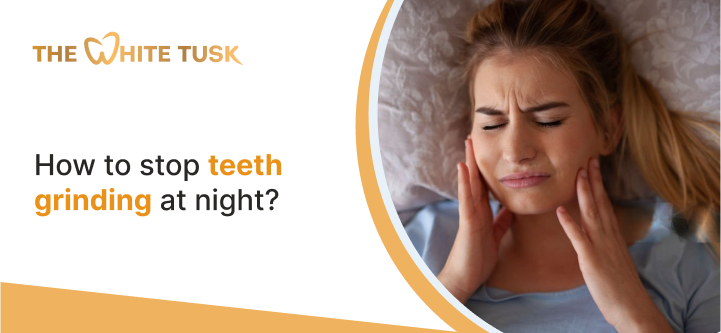
How to stop teeth grinding at night?
Waking up with jaw pain, headaches, or worn-down teeth? You might be grinding your teeth at night—also known as bruxism. Left untreated, this habit can lead to severe dental damage and chronic discomfort. But the good news? You can take control. This blog explains how to stop teeth grinding at night, exploring the causes, symptoms, and the most effective solutions—from lifestyle changes to professional treatments. Whether looking for quick relief or long-term prevention, this blog will help protect your smile and improve your sleep. Let’s put an end to nighttime grinding for good!
What Is Teeth Grinding (Bruxism) and Why Does It Happen?
Teeth grinding, or bruxism is an involuntary habit in which you clench or grind your teeth, often during sleep. It can occur due to various factors, including stress, misaligned teeth, or underlying medical conditions. Many people don’t even realize they’re grinding their teeth until symptoms appear.
Signs and Symptoms: How to Know If You Grind Your Teeth at Night
Since bruxism happens during sleep, it’s not always easy to detect. However, common signs include:
- Worn-down, chipped, or flattened teeth
- Jaw pain or tightness upon waking
- Frequent headaches, especially in the morning
- Increased tooth sensitivity
- Clicking or popping sounds in the jaw
- Disturbed sleep or complaints from a partner about grinding noises
The Hidden Causes of Nighttime Teeth Grinding
Understanding what triggers bruxism is key to stopping it. Common causes include:
- Stress and Anxiety – Emotional stress is a major contributor to teeth grinding.
- Sleep Disorders – Conditions like sleep apnea increase the likelihood of bruxism.
- Misaligned Teeth – Poor dental alignment can put extra strain on the jaw.
- Medications & Lifestyle Factors – Certain antidepressants, caffeine, alcohol, and smoking can increase grinding.
How Teeth Grinding Affects Your Dental Health and Overall Well-Being
Chronic teeth grinding can lead to serious dental and health problems, including:
- Tooth Damage – Enamel erosion, fractures, and tooth loss.
- Jaw Disorders – Increased risk of TMJ (temporomandibular joint) dysfunction.
- Sleep Disruptions – Poor sleep quality, leading to fatigue and irritability.
- Gum Recession – Excessive pressure can weaken gum tissue over time.
Simple Lifestyle Changes to Reduce Teeth Grinding
Making a few adjustments to your daily routine can help reduce bruxism:
- Reduce Stress – Practice relaxation techniques like meditation, yoga, or deep breathing exercises.
- Limit Stimulants – Cut down on caffeine and alcohol, especially before bedtime.
- Establish a Relaxing Bedtime Routine – Avoid screens, listen to calming music, or take a warm bath before sleep.
- Stay Hydrated – Dehydration can contribute to muscle tension in the jaw.
Effective Home Remedies to Stop Teeth Grinding Naturally
If you’re looking for natural ways to stop grinding, try these remedies:
- Jaw Exercises – Gently massaging and stretching the jaw can relieve tension.
- Warm Compresses – Applying a warm towel to the jaw before bed can help relax muscles.
- Calcium & Magnesium Supplements – These minerals support muscle relaxation and may help reduce bruxism.
Best Mouthguards for Teeth Grinding: Do You Need One?
Mouthguards, known as night guards, are a highly effective way to protect your teeth from grinding damage. They come in different types:
- Custom-Fitted Mouthguards – Provided by a dentist, offering the best fit and protection.
- Boil-and-Bite Mouthguards – Available at drugstores, moldable to your teeth for a semi-custom fit.
- Over-the-Counter Mouthguards – These are basic options but are less effective for severe grinders.
Medical Treatments for Severe Teeth Grinding: What Are Your Options?
If lifestyle changes and home remedies don’t help, professional treatment may be necessary:
- Dental Correction – Aligning teeth through orthodontic treatment can reduce grinding.
- Botox Injections – Can relax the jaw muscles and prevent excessive clenching.
- Cognitive Behavioral Therapy (CBT) – Helps address stress and anxiety-related bruxism.
- Medication Adjustments – A doctor may recommend alternatives if grinding is linked to certain medications.
Stress and Anxiety: How to Manage the Leading Cause of Bruxism
Since stress is a leading trigger for bruxism, managing it effectively can significantly reduce teeth grinding:
- Practice Mindfulness & Meditation – Reduces tension and promotes relaxation.
- Exercise Regularly – Physical activity helps lower overall stress levels.
- Seek Professional Help – A therapist can provide stress-management techniques tailored to your needs.
Final Thoughts: How to Stop Teeth Grinding at Night for Good
Teeth grinding at night is common but can be treated. By identifying the cause, making lifestyle changes, and seeking professional help, you can protect your teeth and improve your sleep quality. If you suspect you have bruxism, take action today—your smile (and sleep) will thank you!
